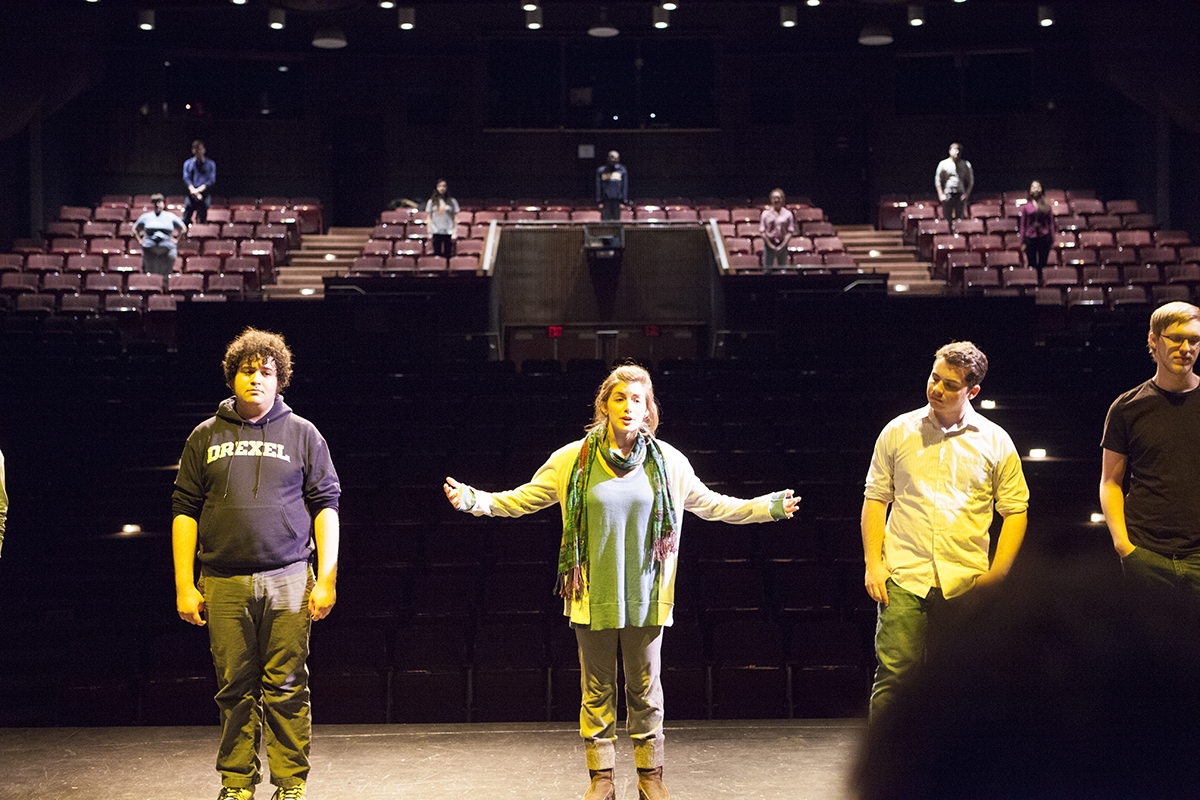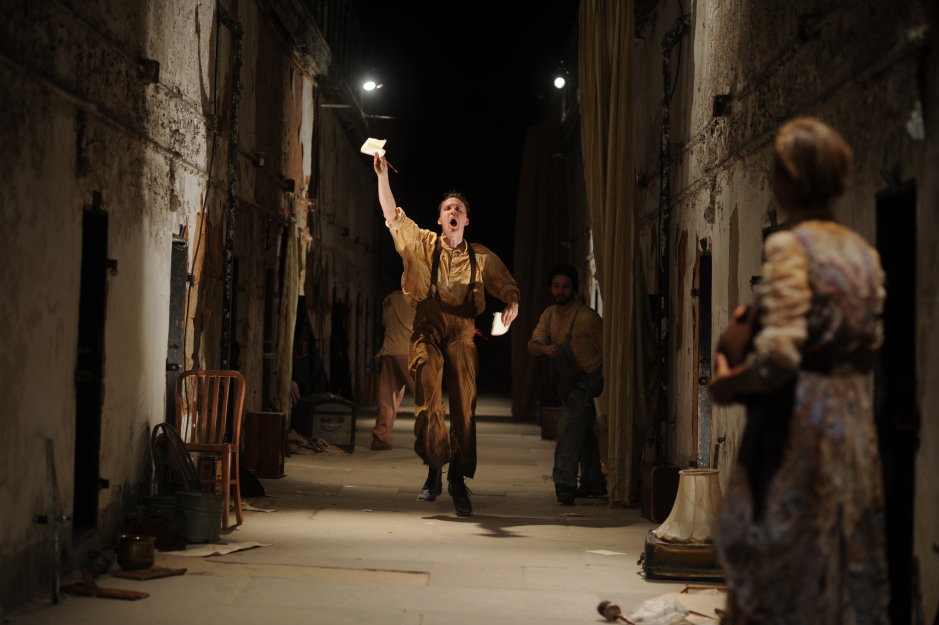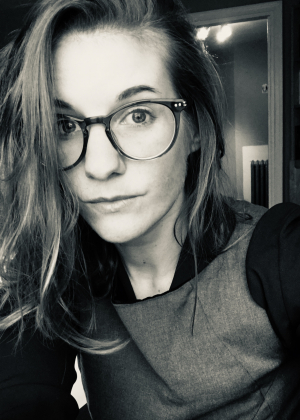We are thrilled to introduce you to new UW Drama faculty member Adrienne Mackey, who joined us this quarter as an Assistant Professor of Acting, Directing, and Devising. Mackey is teaching remotely from her home in Philadelphia this quarter with plans to relocate to Seattle with her husband, Bradley Wrenn, this spring. (Bradley will also be teaching a new course on improvisation next quarter at UW—stay tuned for more about that!)
Professor Mackey is the founder and Artistic Director of Swim Pony, a Philadelphia-based company that “creates unique and deeply investigated live experiences that defy tradition, and invite audiences to become curious, critical thinkers in the world.” Swim Pony’s genre-defying work includes The Ballad of Joe Hill, the story of a union leader on trial for murder that was created and performed inside of Eastern State Penitentiary, and Welcome to Campus, in which audiences explored real stories of the college experience while being led through twelve performance spaces along a two-mile route. Swim Pony’s recent works dive deep into explorations that hybridize theater with gaming. This spring Professor Mackey will teach a course for undergraduates that explores the use of game design in storytelling. (Current UW students: Register for DRAMA 457 A here!)
We sat down with Professor Mackey to find out more about her artistry, scholarship, and how the first few weeks of classes are going.
 WELCOME TO CAMPUS / PHOTO BY KATE RAINES
WELCOME TO CAMPUS / PHOTO BY KATE RAINES
Your work is a lot about how people move through physical space, and also thinking expansively about where theater can happen. In your Swim Pony bio it says, you will do almost anything to get your theater out of theaters. So, it feels to me like maybe you were a little bit more prepared than some of the rest of us for this moment that we're in where we've all been forced out of theaters and forced to think about more expansively about where theatre can happen. How has the pandemic changed or influenced how you think about space and physical space or has it?
It’s interesting because I feel like I have definitely been interested for a really long time in whether theatres actually were places that were best or maybe most efficiently accessing the things that I come to the discipline for. Thinking about the superpower of theatre as compared to narrative television or film—I think if you ask anybody, “Why do you do plays live as opposed to recording them?” I think people will say, “Well, because it’s live, it’s happening right there.” And I think that question about why liveness matters for me comes back to theatre not necessarily as a medium of storytelling, but as a medium for connection and communion. I’m really interested in how different kinds of spaces become opportunities for meaningful and authentic connection. So, when I talk about getting theatre out of theatres, I make a differentiation between the concept and energy and ethos of theatre versus the physical buildings that currently represent our discipline and profession.
I would get mad at theatre, like “Theatre! You don’t know what you are! I think you need to have an identity crisis!”
In the early part of my career I skirted around the center of the contemporary American regional theatre scene. Every idea I had was a really imperfect fit in those kinds of spaces, and I really struggled as an artist. You know, I would get mad at theatre, like “Theatre! You don’t know what you are! I think you need to have an identity crisis!” And I finally got to this point where I realized there’s just no usefulness in getting mad about it, and if something about the way the discipline is being defined right now is not allowing you the space to really explore what the seeds and genesis of it did for you as a creator, call it something else! And that’s okay.
So, I think if you look at the body of work that I made, there’s kind of a really interesting turn that happened seven or eight years ago, where you start to see things that get trickier to explain. Everything, whether that’s taking a 100 mile walk on foot around the perimeter of Philadelphia, or doing a card game that explores mortality by spending ten active minutes in a text message conversation with a character that’s pretending to be your own mortality, or building a tabletop role play for an environmental organization to help people imagine how to deal with environmental catastrophe, all those things are about what I came to theatre for, which is about present-tense dialogue about things that matter to us as people.
So, to come back to your question about the pandemic. There are a lot of pieces that I’ve made that when people look at them they think they’re really suited to this strange moment where we can’t be with each other in physical place. And that’s true as an after-effect, but the seed question of a lot of those projects really had to do with addressing many of the ways in which our lives already were fractured and that we don’t really have connective communal spaces. Or, as we increasingly move toward secularization, I think a lot of us are looking for rituals of meaning and connection. A lot of these projects are my attempts at figuring how to embed those things in my own life and, by extension, having that conversation with the audiences I’m working with.
You said something a couple times that I was interested in which is about why you came to theater, what you came to theater looking for. Do you situate your work and think about your work as belonging in theatre?
I guess it depends on what you mean by theatre. If you asked me, do I think that the work that I make now sits easily in the disciplinary boundaries of theater I would say, probably not.
You know I actually said this during my interviews for this job, I was like, “You know guys, I'm going to be honest, I spend a lot of time trying to convince grant panels that this is theater. And so I’ll just be explicit, if you're looking for somebody who fits easily under that category for this department, I am not the person for this job.”
But I love teaching undergraduates and I love doing scripted plays with folks at that point in their lives, I think, in part because it really reminds me what it was about encountering that experience of practicing putting a story into your body, and just how radical that felt. It was so moving—that time in my life when I when I really kind of clicked in, like, oh, this is the thing I'm supposed to be doing with my time. And I think that the core of that is still at the crux of all the stuff that I make—that feeling of being in conversation, being in rehearsal, being with other people, and being like, here's this collective thing we're exploring and trying to suss out and do justice to and it's something that feels bigger than who we are individually, but it's also something that connects us in the moment.
I think that thing that I felt in classes and rehearsals as a young artist in some ways almost got professionalized out of my working practice for a while. I remember in 2013, right before I went back to grad school, I did a production of a show called The Ballad of Joe Hill, which was a piece exploring this labor organizer who was a musician, and he used music as a tactic around organizing and became this incredible symbol in the nineteen-teens, and he was arrested for a murder he definitely did not commit, and ended up being executed. It was a piece meditating on his decision to become a symbol for this movement. And I'd done a version of that in 2006 that was one of the first pieces I really fully produced in Philadelphia. It was like crazy scrappy, like all of the actors and I would—because we were doing it in this historic prison—we had to build the entire set and take it down every night. You know, we were lifting heavy things, it was dirty, and we kept all the money that for the show in a shoe box. You know! It was exactly that play.
I remember sitting in the booth looking down at the audience, seeing woman in a fur coat in the front row watching this play about a radical labor organizer, and I was like, I think I’m doing this wrong.
And, so my husband—who was my co-creator on it—and I remounted that show seven years later, for literally a 100% scaled up budget right? We went from 1200 dollars that we begged people to give us to 100 times the scale of production. It was the first time that I'd really done the equity contracts thing, and had a real rehearsal process, and felt like I wasn't apologizing for how much I was paying people. And it got crazy positive reviews, and we got to go on NPR, I mean, like, all the things that I sort of had always thought that I'd wanted. And it's not to say I wasn't proud of that second version. It was a better crafted play. As a director, I could look at it and think, I did a better job directing that this time. But I remember sitting in the booth looking down at the audience, seeing woman in a fur coat in the front row watching this play about a radical labor organizer, and I was like, I think I’m doing this wrong. This is a very inefficient way to tell this story and connect to the people that I think this content matters to. And I know why I'm in relationship to it, but something about the vehicle of administration and industry and production is not aligned with my values. So, I had a little bit of an existential crisis after really sitting with that, and it really kind of required me to step back and think about, you know, I’d spent more than a decade developing a set of skills that I had assumed would sort of put me at the top of a particular kind of career game, and I put so much energy focused on that. But once I sort of hit a certain level, for the first time I could step back, because I wasn't so shamed about whether I could do it. I was like, I can. Now it really is incumbent on me to ask if I want and should.

Yeah.
You've been teaching at UW for a few weeks now. How's it going? Have there been any surprises or unexpected discoveries or challenges?
I would say that there aren't any unexpected surprises. I mean, it's the first time I've ever had to teach students I've never had the chance to meet in person, and I'm also really cognizant, particularly with my undergraduate scene study class, that some of these folks I may never get to meet in person. But I have been really struck with the heart and energy and spirit and supportiveness they have for each other, even in the context of this really difficult moment.
I got to meet some of the grad students when I was here for the campus visit, and so I feel like I had a sense of the rigor and care that those folks were going to walk into the room with. But the undergraduates—I think I've taught at ten different undergraduate institutions here in Philly, so I have a pretty wide range of what that that age of student can be so far. And it’s what, five weeks in? I’ve been really struck by how thoughtful the students in this 351 class are. This is not necessarily like the role of the teacher, but I really like them. I think they're really interesting fun people to be around. And I appreciate that some of them are there because they want to be majors some of them are there because they're interested in the class but it's not necessarily the center of what they're going to go forward and do in the world, but I think they're all they're all there with, this sounds cheesy to say, beautiful intentionality and it makes me very, very excited to be joining the program for the long haul.
I think they're all they're all there with, this sounds cheesy to say, beautiful intentionality and it makes me very, very excited to be joining the program for the long haul.
Okay last question, can you just talk a little bit about your spring quarter course.
It’s called Game Design in Live Performance.
When I went back to grad school, one of the things that I really focused in on was this idea of the rehearsal process and the magic of that creative space. One of the things that I've been trying to do is figure out how to make that part of the process something audiences got to be a part of, too. And that was leading me to works that were more interactive and immersive and I think that's something in the theater zeitgeist right now, there’s a hunger. And I think part of that goes back to this question about the superpower of liveness. It's like, well, what’s the thing that can only happen because it's live, because it's dependent on this ephemeral connection that we can't predict or script ahead of time?
And, for me, games were a way to start thinking about, well, how do you structure something that will not be the same every time, something that is dependent on the participant, that requires a player in the very active sense?
And once I started cracking that, it felt like this whole basket of toolkits completely opened up and totally shifted the way I started thinking about structuring performance. And I started thinking about performance as a series of potential interactions, as opposed to a kind of rollercoaster track that you get on and you're going to ride to the end of, no matter how it happens.
I started thinking about performance as a series of potential interactions, as opposed to a kind of rollercoaster track that you get on and you're going to ride to the end of, no matter how it happens.
One of the things that a lot of the works that I've been making more recently can do is that I actually get to learn and change the performance as people come to it. I think that's always true in live performance, but I think the degree to which that's the central part of the process has really shifted, and I have a sense that there's a real reckoning coming. I think that games have a lot to learn from theatre about presence and stillness and connection and communion and ritual, and all these kinds of things. And I think theatre actually hasn't had an opportunity to step back and remember a lot of things about itself, and ask the question that we were talking about at the beginning, that this pandemic moment is kind of provoking. Which is like, well okay, if a movie is always going to have an opportunity to show me Venice with a degree of realism that there's just no set in the world I’m going to build, right? It's not that I'm not going to dig on realism, but I do think there's a metaphoric opportunity and there's a kinesthetic and bodied opportunity that maybe we're not taking as full advantage of. There's something kind of amazing when an actor looks at an audience member and goes [holding up a hair clip] “This is a key,” and obviously it's not; it's my stupid hair clip, right? But that's a relational power, that's a story that we suddenly get to build with each other. The way that you respond to me saying that requires me to be in relationship to you. In a way, this is really different than something that has a static outcome.
And so, this class… [laughs] Can you tell I’m a meandering thought person? So this class is an opportunity to start with several weeks of really practical basic tools that give you some vocabulary and ways to think about how to frame interaction, from the perspective of games. And then a quick overview of some folks that I think are doing some really inventive things in this kind of multi-disciplinary format to give a sense of what's out there already. And the bulk of the class, I hope, is really folks getting a chance to hands-on try and fail and try again and really do the iterative experiment of getting to see, if I wanted to immediately start to do this, what would it look like?
And one of the nice things, having piloted a version of it last semester at my previous school, is that I've got a lot of information about what you can do in our limited format. So there's a lot of things, I think, that are teed up to be super fun experiments where people can negotiate both digital space, but also figure out how to give each other things to do and play with in analog world that hopefully will get back at some of that embodied physical space that I think people are really hungry for.
- Learn more about Swim Pony at swimpony.org
- Register for Drama 457A: Game Design in Live Performance, Spring Quarter 2021, here.
